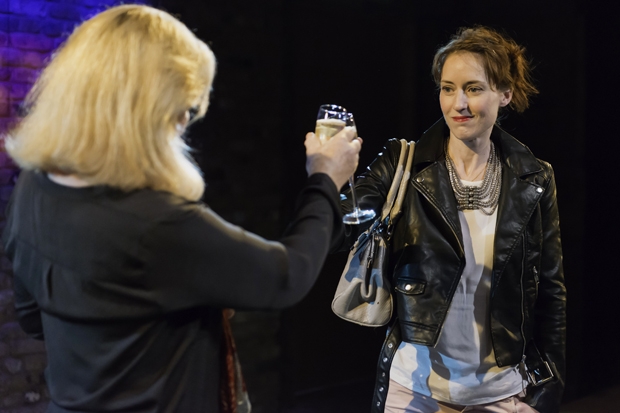It’s hilarious. It’s also annoying that it’s so hilarious. Jonathan Munby’s earthy and glamorous production of Antony and Cleopatra goes almost too far to please the Globe’s fidgety, giggly crowds.
The Egyptian queen is often treated as a female Lear, a trophy role, a lap of honour for a transatlantic facelift as she enters her bus-pass years. But Eve Best is the same age, around 40, as the real thing, and she invests the character with a fine mixture of romanticism, majesty and erotic guile. She also has a strong Home Counties branding. Slender-limbed and deeply tanned, she drifts around her palace in a range of floaty white linen dresses. Her dark-brown hair extensions wouldn’t disgrace a Clairol advert. In battle she appears in a pirate’s cut-down trousers with an armour breastplate sculpted around her shapely torso. Her performance hugs the role just as closely.
When Antony departs for Rome, she quizzes a spy about his activities and her comic frustration is underpinned by real melancholy. Later her amorous isolation and her single-minded defiance are beautifully judged.
But where Best never loses decorum Clive Wood, as Antony, never finds it. Nor even tries to. He conceives the role as an Essex hooligan leading a gang of roisterers on a Club Med booze-cruise. There’s not much sexual magnetism between his wrinkled raunchiness and Best’s delicate and dreamy beauty. It’s like watching a spare Middleton sister forced into a shotgun wedding with Sid James’s cocky stepbrother.
And Wood’s larf-a-minute interpretation cuts against the text, which constantly emphasises Antony’s nobility of spirit. Even his direst foes attest to his charm, generosity and selflessness. And Shakespeare’s language reaches heights almost unparalleled in English poetry in his attempts to depict Antony as a romantic apostle of hedonism. ‘His delights/ Were dolphin-like, they showed his back/Above the element they lived in.’ But Wood can’t resist the Globe’s atmosphere of febrile merriment, and he even turns Antony’s botched suicide into a Norman Wisdom routine. When he fails to plunge the sword in far enough he raises his eyes heavenwards with an ironic smirk. Everyone laughs. And he approves the guffaws with a nod that seems to say, ‘Funny, innit?’ Well, not really.
Phil Daniels offers fine support as an intelligent and subtly humorous Enobarbus. But he too commits suicide in a peculiar manner while sitting weaponless on the ground. Whooshhttt! He just keels backwards in mid-speech as if fried by a far-off drone.
There are other problems in the closing scenes. There always are. The stage directions require the fatally wounded Antony to be hoisted up to a high balcony where Cleopatra awaits him. Two snags there. The staging puts the actors so far from the audience as to destroy intimacy. And the apparatus always looks like a window-cleaning platform. Here, the block-and-tackle system is abandoned and the scene is done at eye level with Cleopatra yanking Antony up a timber chute and on to the stage with a tug-of-war rope. It’s hardly ideal but at least the actors are close enough to express their emotions.
At the end, Cleopatra poisons herself while sitting bolt-upright on a chair fitted with outstretched golden wings. Charmian, fussing around the throne, discreetly closes her eyes like a crafty air hostess disguising the death of a passenger in First Class. These are minor quibbles, though, and the show has all the hallmarks of a hit.
At the Arcola there’s an unusual play by Sarah Daniels about therapy, surrogacy and infertility. Julia is a psychiatrist who trained as an actor and is now forging a career as a stand-up comedienne. It sounds improbable for a woman in her sixties but Julia has a convincing line in coarse ribaldry. ‘Virgin trains? Not a good name. Most of them are fucked.’ And she offers some great home truths about the therapy trade. Experienced clinicians know that the most telling part of a patient’s testimony will emerge as a ‘door-knob revelation’ just as the hour-long session is drawing to a close. Because Julia is using her clinical career for stand-up material she’s desperate to prevent her former patients from discovering her new profession. Meanwhile, she’s trying to build a relationship with the grown-up daughter she gave up for adoption. Daniels is a clever, subtle and amusing writer and her artfully disjointed script creates suspense and intrigue. And the director, John Burgess, gives the play exactly the sort of spare and sophisticated treatment it needs. As far as it goes, it’s excellent. But at just 70 minutes it doesn’t go far enough.







Comments